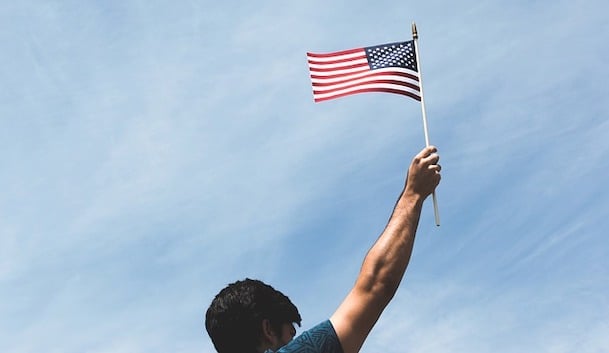We the People…
The world, my friends, is going to… and that’s just the point: We don’t know where in the world the world is going. Only that it’s moving at a high speed, in ways likely to upset existing orders.
And the People are driving this show–the People, yes, as Carl Sandburg entitled his last major book of poetry, back when things, noisy as they were, were stiller than now. Everything is rolling around like steel balls on a hardwood floor. Not much of anything is in repose. And it’s hard to say why. We just know that nothing is still.
How do you feel about young Chinese people waving U.S. flags and clamoring for basic freedoms? It is a beautiful and emotional sight. Nobody stirred them up. They stirred themselves up–spontaneous combustion. One wore a cap with the slogan “Make Hong Kong Great Again.” Us? They want to be like us? Where’d they get such an idea?
We should look longingly and lovingly on these great sights, which may disappear as quickly as the increasingly unlikely sufferance of Xi Jinping. The point will remain, whatever the Mainland does to the rebellious former British colony. People as people–creations of the Lord Most High–are stunning things. They are everywhere. They want different things, some good and some bad. Not a few of them want truth and beauty and freedom.
“The people,” Sandburg wrote, “is a Pandora’s box, humpty dumpty, a clock of doom and an avalanche when it turns loose.” That seems exactly right, whatever any of us may believe about democracy, universal suffrage, cultural vulgarity, trillion-dollar deficits, Bernie Sanders or Donald Trump. We struggle to understand. We might content ourselves with some civilized celebrating.
Historians are going to diagnose the Trump years as symbolic of the Great Loosening through which the world is going: wars that won’t stop, Brexit, immigrant waves beating against man-made barriers, revolutions in how we talk and think and will and desire.
Not everything is going to look like those photos of young people in Hong Kong waving American flags, saying, like the Macedonian in St. Paul’s vision, come over and help us. These are People. So are the soldiers the regime may loose on them, to the surprise, we will find, of almost no one. The world must brace itself. The spirit of Hong Kong may perish for a while.
Nevertheless, “controlling” the people is the hardest of human enterprises. The people, recognizing themselves as such, seldom want to be controlled. They want to do–witness Hong Kong–what they take a notion to do. Controls, as we see, don’t work well when the people decide to go a new way–living where they want, saying what they want.
The point that comes presently to mind is the need for constantly reminding today’s people of the enduring things that yesterday’s people left for them to admire and live by: the rule of law, the appreciation of virtue and kindness, the profound difference between good and bad choices and the ideal of personal restraint.
The great need of the age is, ipso facto, good teaching, in contrast with the nonteaching and anti-teaching to which we’ve all become accustomed in recent decades. There are no worthwhile objects in the closet of history, just violence, oppression and racist outrages. As if no one who lived without an iPhone had a single thought touching on human satisfactions and joys! We need constantly to remind ourselves that yesterday’s people have much to teach today’s people–some of it embedded in our founding documents. Take the one that begins, nervily, “We the People of the United States, in Order to form a more perfect Union …”
People, especially empowered people, will do what they want to do when an insight dawns. The love of freedom–responsible freedom–lives on amid the chaos of change.
Whenever and wherever the avalanche hailed by Sandburg descends, it will necessarily deafen and distract. What it mustn’t be left to do is extinguish the joy of seeing one people waving the flag of another people, fatigued and divided as they are, forgetful of how much the world has come to owe them.
William Murchison is writing a book on moral reconstruction in the 21st century. His latest book is The Cost of Liberty: The Life of John Dickinson. To find out more about William Murchison, and to see features by other Creators Syndicate writers and cartoonists, visit the Creators Syndicate website at www.creators.com.
COPYRIGHT 2019 CREATORS.COM

Leave a Reply